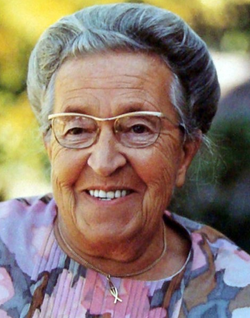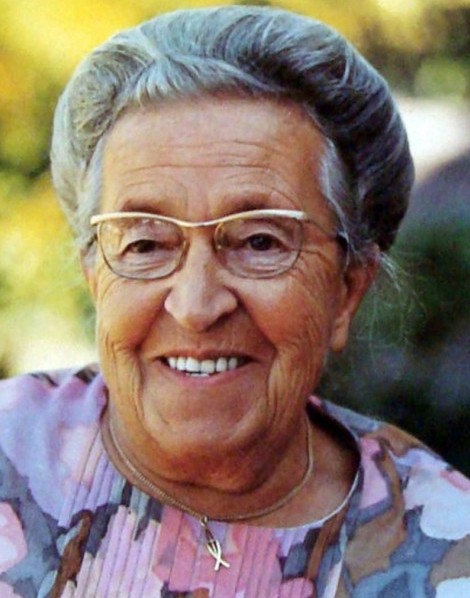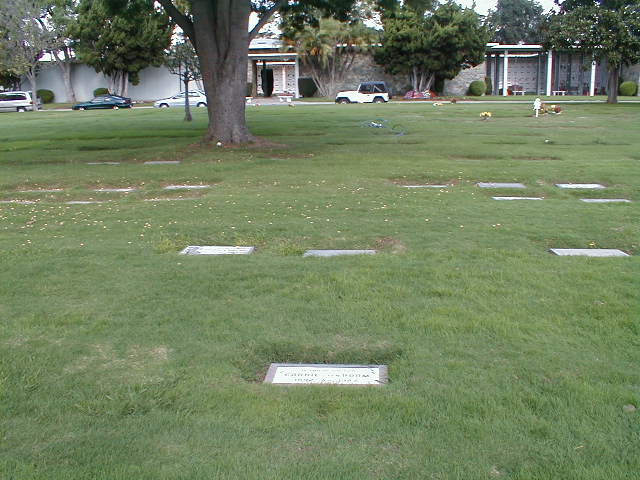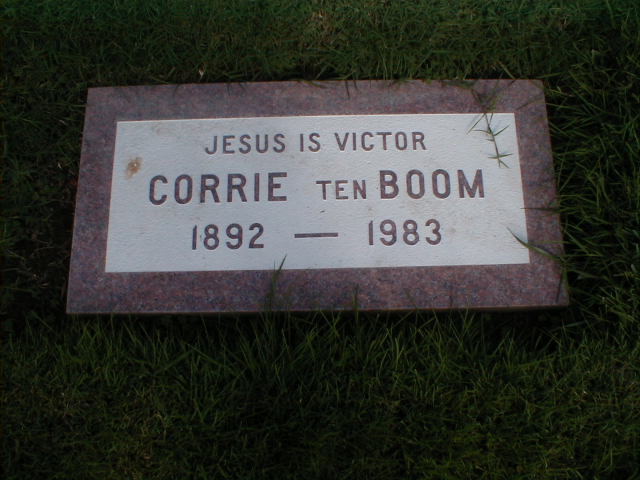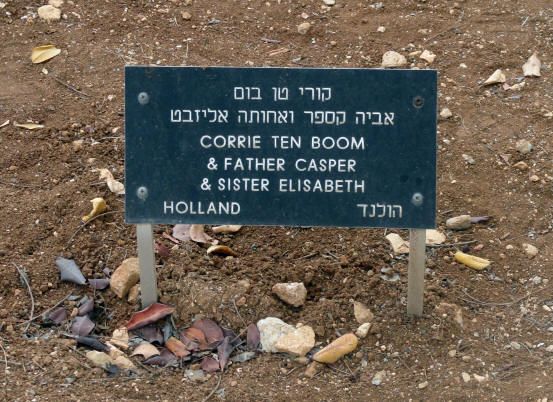Born April 15, 1892, in Haarlem, Holland, Cornelia "Corrie" ten Boom was the child of Casper and Cornelia ten Boom. Her father was a second-generation watchmaker, a trade which Corrie also learned. During her adult years, Corrie became the first female licensed watchmaker in Holland. The ten Boom family held membership in the Dutch Reformed Church.
The family's devout faith soon became tested during the Nazi occupation of Holland in World War II. The ten Boom family opened their home to anyone in need of food or assistance. During the Nazi persecution of the Jews, the ten Booms took in Jews and hid them within their home. Some of the Jews stayed only a short period until permanent arrangements could be made elsewhere. Using her occupation as a watchmaker as a cover, Corrie ten Boom participated in a network of resistance workers. Through her contacts, Corrie met an architect who designed a secret room for the top floor of the ten Boom home. The residence became the permanent home for several Jews, and the ten Boom family conducted routine drills to ensure the Jews could reach the hiding place quickly in case the Nazis searched the home.
On February 28, 1944, the Gestapo raided the ten Boom home. Six individuals including both Jews and resistance workers managed to reach the secret room and remain undetected during the raid. The Gestapo arrested the entire ten Boom family. After several days, the Gestapo released all but three family members. The Nazis sent Corrie, along with her sister Betsie and her father Casper, to prison in the coastal town of Scheveningen. Corrie's father died after only 10 days in prison. Corrie and her sister Betsie remained in Scheveningen until June 1944. At that time, the Nazis transferred Corrie and Betsie to Vught Concentration Camp located within Holland. The sisters remained there until September 1944, when the Nazis evacuated the camp and sent Corrie and Betsie to Ravensbruck Concentration Camp in northern Germany.
Throughout their imprisonment, Corrie and Betsie held Bible studies and spread the Gospel of Jesus. The sisters continued their teachings while enduring countless cruelties by the Nazi camp attendants. Corrie's message of Christ's love often included the phrases, "There is no pit so deep that God's love is not deeper still," and "Jesus is Victor." Due to the sisters' evangelism, many women at Ravensbruck accepted Christ as their personal Savior. During the last days of their imprisonment, Betsie stated that God told her that both sisters would be free of Ravensbruck before the year 1945. Prior to the end of December 1944, Betsie ten Boom died at Ravensbruck and went to be with her Savior in Heaven. The Nazis released Corrie shortly thereafter. Years later, Corrie learned that her release from prison occurred due to a clerical error. Many of the remaining women at Ravensbruck died in the gas chambers.
Following her release, Corrie ten Boom told of her experiences in the Nazi camps and her struggle to forgive her captors. She used her message to present the Gospel of Christ and often stated that "You can never learn that Christ is all you need until Christ is all you have." During the next 32 years of her ministry, Corrie traveled to 60 countries and wrote numerous books and devotionals. Perhaps her best-known work includes her 1971 book "The Hiding Place," a best-seller which chronicled her experiences. In 1975, World Wide Pictures and the Billy Graham Evangelistic Association created the motion picture, "The Hiding Place," based on her earlier book. In her later years, Corrie moved to California to be closer to the film industry, a medium she utilized to spread the Gospel message.
After suffering several strokes which rendered her an invalid, Corrie died in Placentia, California, on April 15, 1983. She died on her 91st birthday, an occurrence which Jewish tradition states God grants to special individuals. Corrie was buried in Fairhaven Memorial Park in Santa Ana, California. Her tombstone proclaims the message that "Jesus is Victor."
Born April 15, 1892, in Haarlem, Holland, Cornelia "Corrie" ten Boom was the child of Casper and Cornelia ten Boom. Her father was a second-generation watchmaker, a trade which Corrie also learned. During her adult years, Corrie became the first female licensed watchmaker in Holland. The ten Boom family held membership in the Dutch Reformed Church.
The family's devout faith soon became tested during the Nazi occupation of Holland in World War II. The ten Boom family opened their home to anyone in need of food or assistance. During the Nazi persecution of the Jews, the ten Booms took in Jews and hid them within their home. Some of the Jews stayed only a short period until permanent arrangements could be made elsewhere. Using her occupation as a watchmaker as a cover, Corrie ten Boom participated in a network of resistance workers. Through her contacts, Corrie met an architect who designed a secret room for the top floor of the ten Boom home. The residence became the permanent home for several Jews, and the ten Boom family conducted routine drills to ensure the Jews could reach the hiding place quickly in case the Nazis searched the home.
On February 28, 1944, the Gestapo raided the ten Boom home. Six individuals including both Jews and resistance workers managed to reach the secret room and remain undetected during the raid. The Gestapo arrested the entire ten Boom family. After several days, the Gestapo released all but three family members. The Nazis sent Corrie, along with her sister Betsie and her father Casper, to prison in the coastal town of Scheveningen. Corrie's father died after only 10 days in prison. Corrie and her sister Betsie remained in Scheveningen until June 1944. At that time, the Nazis transferred Corrie and Betsie to Vught Concentration Camp located within Holland. The sisters remained there until September 1944, when the Nazis evacuated the camp and sent Corrie and Betsie to Ravensbruck Concentration Camp in northern Germany.
Throughout their imprisonment, Corrie and Betsie held Bible studies and spread the Gospel of Jesus. The sisters continued their teachings while enduring countless cruelties by the Nazi camp attendants. Corrie's message of Christ's love often included the phrases, "There is no pit so deep that God's love is not deeper still," and "Jesus is Victor." Due to the sisters' evangelism, many women at Ravensbruck accepted Christ as their personal Savior. During the last days of their imprisonment, Betsie stated that God told her that both sisters would be free of Ravensbruck before the year 1945. Prior to the end of December 1944, Betsie ten Boom died at Ravensbruck and went to be with her Savior in Heaven. The Nazis released Corrie shortly thereafter. Years later, Corrie learned that her release from prison occurred due to a clerical error. Many of the remaining women at Ravensbruck died in the gas chambers.
Following her release, Corrie ten Boom told of her experiences in the Nazi camps and her struggle to forgive her captors. She used her message to present the Gospel of Christ and often stated that "You can never learn that Christ is all you need until Christ is all you have." During the next 32 years of her ministry, Corrie traveled to 60 countries and wrote numerous books and devotionals. Perhaps her best-known work includes her 1971 book "The Hiding Place," a best-seller which chronicled her experiences. In 1975, World Wide Pictures and the Billy Graham Evangelistic Association created the motion picture, "The Hiding Place," based on her earlier book. In her later years, Corrie moved to California to be closer to the film industry, a medium she utilized to spread the Gospel message.
After suffering several strokes which rendered her an invalid, Corrie died in Placentia, California, on April 15, 1983. She died on her 91st birthday, an occurrence which Jewish tradition states God grants to special individuals. Corrie was buried in Fairhaven Memorial Park in Santa Ana, California. Her tombstone proclaims the message that "Jesus is Victor."
Bio by: Luke Williams
Inscription
JESUS IS VICTOR
Family Members
Advertisement
See more ten Boom memorials in:
Explore more
Sponsored by Ancestry
Advertisement
